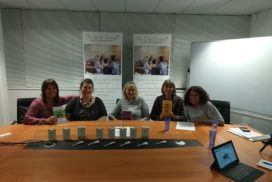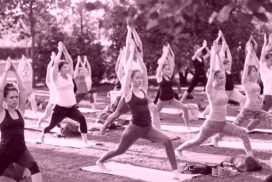Sylk Director Nicky reflects on life as a midlife mum, what it means to be in perimenopause, and the importance of educating women on the hormonal journey experienced by us all.
Saturday morning run with the girls
On my Saturday morning run with my girlfriends, as we jog we share and update each other on the events of the past week. We offload our work stress, and catch up on our kids, some of whom are bordering on becoming ‘tweens’; wanting hugs and playing with their dolls one minute, then slamming doors and shouting ‘leave me alone’ the next. We laugh about the constant pain of getting homework done on time, share the worry of our parents’ various ailments, and reminisce about nights out we’ve been on and look forward to nights out we have planned. You know; the usual stuff your average bunch of mid-lifer Mums talk about.
We’ve known each other a long time and my friends all know my business, Sylk, is a lubricant which is used by menopausal women. So, we’re not afraid to share some of the more intimate stuff that’s troubling us. Erratic and heavy periods when they’ve been regular for years; low mood for no reason; constantly feeling tearful; waking up drenched in sweat; not wanting to have sex; and a weird brain fog that can feel like you’re wading through tar.
“Surely I’m not going through the menopause… doesn’t that happen when you’re over 50 and your period’s stopped? Is there a test I can take?” my friend asked me last Saturday.
“I can’t be going through the menopause… I’m only in my 40s!”
What strikes me as we reach our mid 40’s is the confusion that surrounds menopause. My friends are all intelligent, well informed women. But when it comes to menopause and the huge role hormones play in maintaining and regulating our bodies, they’re all really in the dark. But why?
Up until now there hasn’t really been much information around hormones and menopause. It was very much something that happened ‘when you were older,’ and no one really talked about it. I think women assume their periods will just stop one day, which may bring on hot flushes and night sweats. Then we’ll know we’re ‘in the menopause’, right?
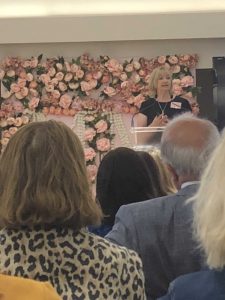
Kathy Abernethy
But that’s not the case.
A conference for women
Megs Menopause, founded by Meg Mathews, hosted an event on Monday 21st, that was very needed. A conference day for women approaching menopause, or are in the throes of perimenopause and beyond, it featured expert speakers on a range of topics that covered all aspects of the menopause. From night sweats and hormones, to vaginal dryness and low sex drive, everything you needed to know was there. And it was great to see so many women looking to understand the changes happening in their bodies.
Educating women
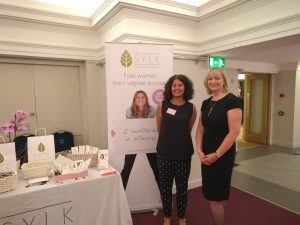
Sylk Director Nicky with Kathy Abernethy
What I learnt from the day was that all women; our sisters, friends, mothers and daughters (especially our daughters); need to be informed about the hormonal journey their bodies go through, from cradle to grave. The symptoms my friends describe could well be due to their hormone levels starting to fluctuate as they enter the perimenopause, the time before your periods actually cease. Perimenopause can often cause more troubling symptoms than when your periods finally stop. But you know, as Kathy Abernethy, Chair of the British Menopause Society, reinforced at the conference, women don’t have to ‘just put up with it’. There are many simple ways to manage symptoms and you can (and should) go to see your GP or a specialist menopause clinic.
Simple Solutions
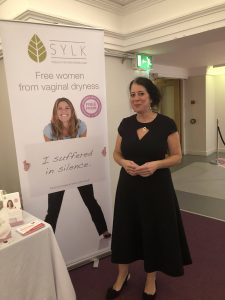
Claudine Domoney
Kathy and many of the speakers like Heather Currie and Claudine Domoney reinforced that women don’t have to wait for their periods to stop before seeking help. I thought this was so vital. If your symptoms are affecting your day to day life, you can take HRT whilst you are still menstruating, though this may not be the answer in all cases. Sometimes diet and lifestyle changes can make a huge difference. Exercise, eating the right foods and supplements, getting enough sleep, and reducing caffeine and alcohol, all make a big difference to the way your body reacts to the hormone changes in your body.
Sadly though, not all GP’s are well educated about menopause. A great piece of advice shared by Kathy Abernethy was when making an appointment, just ask the receptionist which GP deals with women’s issues like menopause. Also, if you don’t feel you are getting the answers you need, it is your absolute right to ask to be referred to a menopause clinic.
Education for our daughters
My daughter is due to have a nurse visit in school to talk about puberty. We’ve already spoken about the changes her body is starting to go through. I will also make sure she understands the role hormones play in her body throughout her life. I hope she won’t be afraid of the changes that will occur, and will be aware of any potential symptoms and how she can manage them. As Marilyn Glenville explained at the conference, eating a good nutritious diet is a great way of balancing hormones. Simple tips like eating foods rich in magnesium and green leafy vegetables all get the thumbs up. So we’ll be stocking up on nuts, kale and broccoli for the women in our house going forward!
Here’s to lots more events aimed at women to inform and inspire them throughout life.
We’re delighted to be supporting the Rejuvage Midlife, Menopause, Sex and Happiness evening in central London on 13th June, featuring a talk from Kathy Abernethy and top sex and relationship therapist Sarah Doherty. Tickets available here




